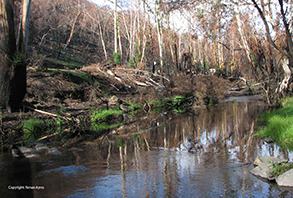Water quality following bushfires can be severely impacted. Reduced water quality can alter the dynamics of stream ecosystems in many complex ways.
Acute effects occur if there is heavy rain soon after fire. The loss of vegetation and altered soil structure can make fire-affected soils can increase erosion and cause sediments and pollutants to enter aquatic environments, which can cause fish kills and have long-term impacts on the local environment.
Fire can trigger chemical reactions which can release nutrients, metals and other toxicants into the water following rains. These toxicants can have both short term and long term impacts on the local wildlife, and can have devastating consequences on food-webs.
Water quality monitoring
It is critical that as soon as it is safe to do so that water quality monitoring programs are implemented. This will firstly assess the immediate impact of the fire and secondly allow a baseline to be established for on-going recovery monitoring. Feedback from these on-going monitoring programs should allow adaptive management strategies to be implemented.
See here for more information on monitoring solutions and here for more general information on the impacts of fires on water quality.
Who is responsible
It is the job of the State, territory and local governments to implement recovery strategies following fires and also for bushfire planning, including appropriate risk management, early detection systems and public warnings.
For more information on water catchments, contact your local water authority
See these additional resources for regional bushfire management:
- Arthur Rylah Institute for Environmental Research
- Recovery After Fire: Practical Steps for Landholders, Victorian Department of Primary Industries PDF [2.12 MB, 35 pages]
- Victorian Bushfires Royal Commission Final Report, 2009.
See the following references for more information on water quality guidance


